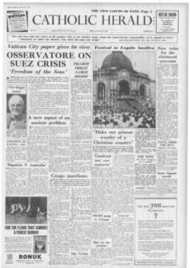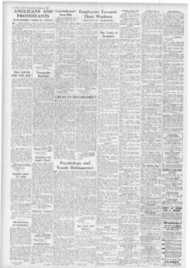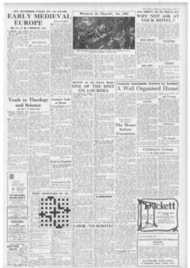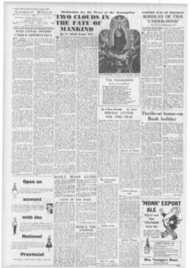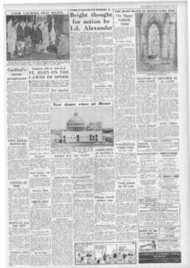Page 1, 10th August 1956
Page 1

Report an error
Noticed an error on this page?If you've noticed an error in this article please click here to report it.
Tags
Share
Related articles
Osservatore On Suez Crisis
Why Was Belgium So Blind ?
Angola: Archbishop's Reply
A Lightning Change In Belgian Policy
Bishop Visits Mutineers And Premier
Congo manifesto
AFRICAN Catholics, with some European advisers, have issued a manifesto on national emancipation which, says the Leopoldville correspondent of the Fides News Service, may become the turning point in Belgian Congo politics."
The manifesto appears in "Conscience Africaine," a bulletin founded three years ago by philosophers and sociologists. It is edited by Congolese, who wish to show that they are able to get the bulletin out themselves, with Europeans doing only proof reading,
The statement was issued on the occasion of the celebration of the 75th anniversary of the foundation of the city of Leopoldville, capital of the Belgian Congo, after the State had passed from the Royal Crown to the sovereignty of the Belgian Government.
It states the position of the Congolese Catholics towards the Belgian Government and the future of their country.
The salient points of the manifesto are :
The National Goal: We believe that the Congo is destined to become a great nation in the centre of the African Continent. Since it is possible to speak of a Congolese nation composed of Europeans and Africans it is incumbent on all to be inspired with a desire to serve the Congo.
Unity with Diversity: The colour of one's skin is no guarantee of privileges. We wish to have a Congolese civilisation without segregation. We reject vigorously the principles of equality but separation. The best of what is European and African should he brought together.
The Belgian Congo Community: The Congolese who consider these problems fear that certain persons may distort this idea in order to put a curb on total emancipation of the Congolese people. By such means Europeans could continue indefinitely to dominate.
Political Emancipation: The Belgian Government in order to show its sincerity should set up a 30-year plan with the purpose of bringing about the complete emancipation of the Congo.
Social and Economic Emancipation: Participation of the Congo
lese in the direction of agricultural, industrial and commercial enterprises. Nationalisation and State Capitalism are rejected. The policy of low wages. however, should be abolished.
Attitude towards the Belgian Government: We in no way desire to be a part of the Belgian Government. We would not acknowledge a Belgian Congo Federation imposed on us without our consent. We desire that such a federation be one day the result of free deliberation.
Order and Respect for Authority: We wish to respect authority but we also demand that our opinions be given due consideration.
Finally the manifesto launches an appeal to Europeans and Congolese to strive towards Congo unity.
The Fides Correspondent adds: The manifesto was enthusiastically received by those who would like to see a change.
A great number of Europeans expressed indignation. It is important to remind them, however, that the manifesto was drawn up by a group of Congolese Catholics with some European advisers with a view to facing the realities of the modern mind and the changing world.
It is to be noted that changes advocated by the Socialists and liberalists are the other extremes, and should they become numerous, they would constitute a real danger to the Congo country.
NOTE: Fides is the news service of the Sacred Congregation of the Propagation of the Faith.
Mgr. Cardijn
The Holy Father has appointed Canon Cardijn, founder of the Young Christian Workers. a Domestic Prelate with the title of Rt. Rev. Monsignor, on the occasion of the 50th anniversary of his ordination.
blog comments powered by Disqus


